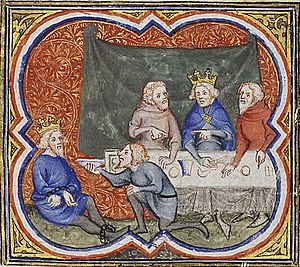This article uses texts from within a religion or faith system without referring to secondary sources that critically analyze them. (June 2024) |
| Judah's revolts against Babylon | |||||||
|---|---|---|---|---|---|---|---|
 Zedekiah is chained and brought before Nebuchadnezzar II, from Petrus Comestor's Bible Historiale (1372) | |||||||
| |||||||
| Belligerents | |||||||
|
Kingdom of Judah Supported by: Twenty-sixth Egyptian dynasty |
Neo-Babylonian Empire Supported by: Kingdom of Moab Kingdom of Ammon Chaldea | ||||||
| Commanders and leaders | |||||||
|
Jehoiakim † Jehoiachin Zedekiah Pashur Ben-Amar Jehuchal Ben-Shelamiah Gedaliah Ben-Pashur Sefaniah Ben-Masiah Shefatiah Ben-Matan Pashur Ben-Malkiah |
Nebuchadnezzar II Nebuzaradan | ||||||
| Strength | |||||||
| Much fewer | Unknown | ||||||
| Casualties and losses | |||||||
| More than 4,200 captive, many slain | Unknown | ||||||
| Based on Kings 2:24 and 25 of the Hebrew Bible and Old Testament | |||||||
Judah's revolts against Babylon (601–586 BCE) were attempts by the Kingdom of Judah to escape dominance by the Neo-Babylonian Empire. Resulting in a Babylonian victory and the destruction of the Kingdom of Judah, it marked the beginning of the prolonged hiatus in Jewish self-rule in Judaea until the Maccabean Revolt of the 2nd century BCE. Babylonian forces captured the capital city of Jerusalem and destroyed Solomon's Temple, completing the fall of Judah, an event which marked the beginning of the Babylonian captivity, a period in Jewish history in which a large number of Judeans were forcibly removed from Judah and resettled in Mesopotamia (rendered in the Bible simply as "Babylon").